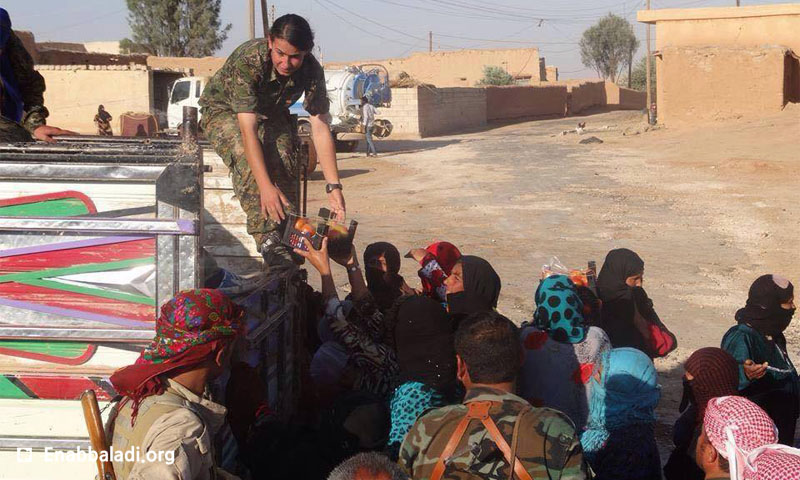Enab Baladi – Hassakeh
Syrian refugees are a familiar scene in neighboring countries, but now the reverse is also true. Hundreds of displaced Iraqi families crossed the border into Syria and have resided in the refugee camps that were established in Hasaka, especially after the last military campaign launched by the Popular Mobilization Forces and Iraqi Forces against Daesh in Fallujah.
The numbers of internally displaced families from Iraq have increased recently. All of these families are coming from the cities of Mosul, Rabia, and Fallujah, according to Ghannam Al-Sayar, a resident of Tarbil, south of Hasaka, which is receiving the refugees.
Ghannam said that some of the families are moving to the Al-Malikiya Refugee Camps, located in the furthermost northeastern region of Syria, while others are heading to Al-Hawl near Hasaka. The exhausting journey takes many long hours just to cross the border.
Dedicated Camps for Iraqi Refugees
Prior to the military operations in Fallujah, the Nuruz Refugee Camp was established in the area of Dirk, which is close to the Iraqi border. The Nuruz Refugee Camp has received approximately 350 families since the attack on Mount Sinjar, a majority of whom are Yazidi. Other camps were also established like the Al-Ruj, Al-Mabruka, and Al-Hawl Refugee Camps.
The “Self-Management” allocates and supervises camps. Al-Hawl and Al-Mabruka are for Iraqi refugees and are managed by a board of affairs of affiliated organizations for the administration. They provided cars to move the refugees from the border to the camp.
Sakina Ja’afr, an employee with the organization Ruj-Afa, said that Al-Hawl Refugee Camp is equipped with the best services like water, tents and electricity. She noted that Ruj-Afa organization is working in coordination with the board to “provide the best for Iraqi refugees from the brutality of war,” in providing services to approximately 500 Iraqi families in the camp.
Expected Increase in the Number of Internally Displaced Persons (IDPs)
The war in Iraq continues and is increasing its turf. The number of immigrants will increase with nowhere to go except Syria, which is witnessing a complicated war that began violently when the head of the Regime, Bashar Al-Assad, turned against the popular uprising that was raging against him in 2011.
The province of Hasaka lives in relative calmness compared to the rest of Syria, as it is beyond the control of the Syrian regime. However, repeated explosions and surprise attacks conducted by Daesh threaten its relative calmness. The province is witnessing recent and repeated clashes between fighters of the Kurdish People’s Protection Units and the Syrian regime’s forces, and those loyal to the regime.
Hazim Al-Blu, an IDP from Mosul residing in the Al-Mabruka Refugee Camp, said that the Iraqis are fleeing from being used as human shields for Daesh in hopes of finding a more peaceful place. He pointed out that dozens of Iraqi families arrive daily to the Al-Hawl Refugee Camp, while others head to Al-Mabruka Refugee Camp, which is approximately 50 kilometers from the city of Ras.
Mr. Al-Blu considers the war in Iraq as different from the war in Syria. “The Iraqi government seeks the elimination of Daesh and not the killing of its people. This is unlike the Syrian government, which is exterminating its people.”
Fatima Al-Hasan, is a recent IDP from the neighborhood “Al-Shuhada” in Fallujah. She said that she arrived in Syria with her five children with the help of the Iraqi Security at the border after her husband was arrested.
Ms. Hasan explained that she was “relatively comfortable inside the camp.” She attributed her relative comfort to “supervisors who care about refugee issues and provide the best.”
Narmin Sayamind, an employee with the environmental protection organization “Yan,” explained that her organization counted several families that arrived to the Al-Hawl Refugee Camp. She noted that there are 212 families at the camp through this June.
Ms. Sayamind expects an increase in the number of families in the coming days. She pointed out that six other organizations and two charities are providing all of the services for the IDPs, each according to its purview.
Fears of Spreading Diseases
With the arrival of several Iraqi families to the camps in Hasaka there is an increased fear of the spread of infectious diseases, most notably cholera, which has recently spread in Iraq.
Shallal Al-Madri, an Iraqi citizen who resides in the Al-Hawl Refugee Camp, said that Iraq is becoming a ripe environment for communicable diseases, pointing out that there is a possibility of transmitting diseases among refugees.
Mr. Al-Madri implored all international medical organizations to visit the camps and stand up to this grave situation by providing the necessary vaccines and medical drugs, and “examine everyone who enters the camp to prevent the spread of diseases and epidemics.
“Self-Management” established the camps in Hasaka that will receive incoming refugees from the provinces inside Syria before the arrival of those fleeing from Iraq. Nuruz Refugee Camp is considered the first and largest camp. It was established last May in the area of Al-Kujarat, located in the Hasaka countryside under the name “Cree Rish.” It houses Iraqis and Syrians.
In conversations with Enab Baadi, Iraqi IDPs considered that they are bearing the “burden of living,” as a place of refuge. Shiru Shibib, a Yazidi that was displaced by Daesh during the attack on Mount Sinjar added, “the services are good here, but when the danger posed by Daesh ends we will return to our country.”
